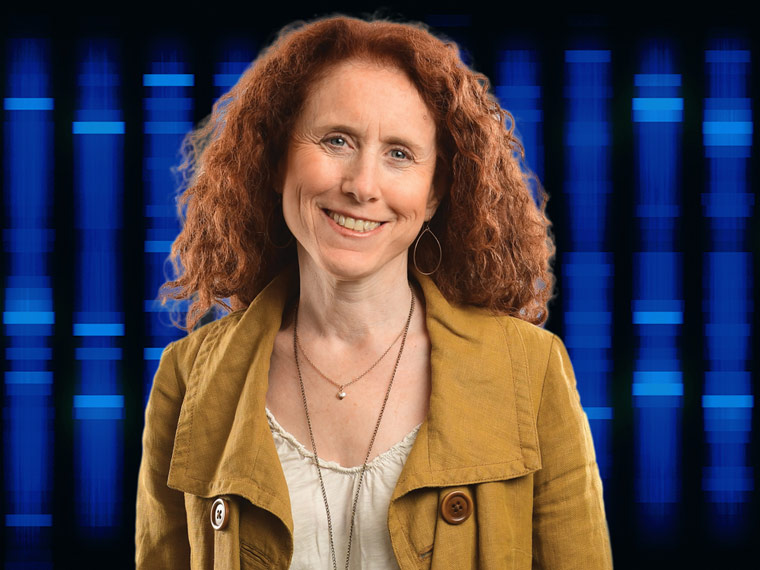As the director of student research in human genetics, Laura Hercher MS ’01 often finds herself pondering ethical issues that echo ancient moral inquiries.
A best-selling book, a Hollywood takedown, and some dogged journalism have peeled away the veneer obscuring the long-term effect of head injuries for athletes—from grade schoolers to the pros, and football players in particular.
It’s a conversation that has placed the Joan H. Marks Graduate Program of Human Genetics—and its director of student research, Laura Hercher MS ’01—at the intersection where advances in medical science and genetic engineering run headlong into moral inquiries that date to the time of Socrates.
Hercher and her students entered the fray in the wake of a report identifying apolipoprotein E epsilon 4 (APOE e4), a known risk factor for late-onset Alzheimer’s disease, as a genetic marker for the risk of a slower physical and cognitive recovery after traumatic brain injury.
“Genotype alone should never be a reason to dictate who can and cannot play.”
The new APOE e4 findings prompted a team of Sarah Lawrence researchers, led by Hercher, to launch their own study. The team sought to gauge the level of interest among athletes in a test that could reveal the presence of a gene that might suggest they were at greater risk following a head injury. Such a finding, of course, could lead doctors or coaches to think twice about allowing them to return to play. Nearly 75 percent of the 845 NCAA athletes responding to the Sarah Lawrence inquiry said they were “possibly interested” or “very interested” in the genetic testing. The outcome, Hercher says, helps debunk a stereotype that young adults have little interest in scientific inquiry.
“Who says teens don’t care?” Hercher asks. “They were very open to learning. The message we got from our study is that they wanted the information and felt that it was useful for them.”
In addition to research methods, Hercher teaches the principles of medical and genetic ethics, integral courses for students enrolled in what was the first graduate school program in the United States devoted solely to human genetics.
Another outcome generated by the survey—over 90 percent of participants said they were not averse to being tested for APOE e4 as a “condition of participation” in competitive sports—indicates college athletic departments have great leverage over their students, should they choose to join the Sarah Lawrence researchers at the crossroads where ethics meets scientific breakthrough. Hercher, in fact, believes the day when sports-induced traumatic injuries force sports programs to mandate genetic testing for athletes could be imminent.
“Genes can be a part of the picture. The question is who should make the decision.”
“I think colleges are going to look at ways to mitigate the risk” of traumatic brain injuries, she says. “They are under a lot of pressure to do something to address the issue in high-contact sports.” Hercher, who advocates “giving people good information and letting them make their own decisions,” suggests schools proceed with caution.
“Genotype alone should never be a reason to dictate who can and cannot play,” she says. “Genes can be a part of the picture. The question is who should make the decision.”
With the APOE e4 outcomes complete, the next Hercher-led research team will return to athletes, seeking input on stakeholders’ interest in a test to identify genes linked to cardiac abnormalities. But before the cardiac study gets fully under way, another event, one of monumental significance, sits atop the Hercher agenda: She recently co-authored a policy statement, published in the American Journal of Human Genetics, for the American Society of Human Genetics. The statement advocates for transparency and oversight as advances in research hurtle toward what genetic scientists and counselors say is the inevitable development of human embryos in a lab.
Written by Steve Giegerich
Photo by Chris Taggart
